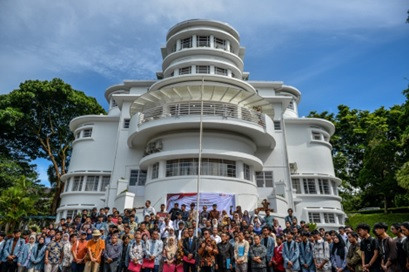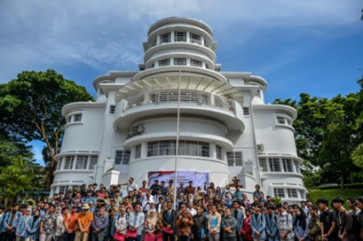Popular Reads
Top Results
Can't find what you're looking for?
View all search resultsPopular Reads
Top Results
Can't find what you're looking for?
View all search resultsScience communication efforts hindered by academic struggles
The repercussions outspoken academics face serve as a stark reminder of the precarious state of freedom in our educational institutions.
Change text size
Gift Premium Articles
to Anyone
 Academic freedom: Professors, lecturers and students of the Indonesia Education University (UPI) in Bandung gather on Feb. 5, 2024 outside the Isola Building on the university’s campus to express their concerns about the government’s partiality toward a certain presidential candidate pair. (Antara/Raisan Al Farisi )
Academic freedom: Professors, lecturers and students of the Indonesia Education University (UPI) in Bandung gather on Feb. 5, 2024 outside the Isola Building on the university’s campus to express their concerns about the government’s partiality toward a certain presidential candidate pair. (Antara/Raisan Al Farisi )
n
our recent opinion article published by The Jakarta Post on Feb. 17, we underscored the vital importance of revisiting science communication in light of Prabowo Subianto and Gibran Rakabuming Raka’s political ascent. The piece was met with a wave of enthusiasm from academics eager to embark on this mission.
However, along with this support, there have been valid concerns regarding the feasibility of placing such a hefty responsibility on Indonesian academia, given the current restrictive research ecosystem and limited support.
Our last opinion piece underlined the urgency for the academic sector to step out of its ivory tower, shedding self-imposed restraints to connect with society at large and nurture an informed citizenry. This is especially critical in the context of Prabowo's election, a figure whose past and affiliations raise concerns about human rights, and the implicit support he has received from President Joko “Jokowi” Widodo, whose government has grown repressive and anti-science in his later years.
The question looms: Who will undertake the vital mission of science communication when academia is already overwhelmed by trivial administrative duties and demoralized by insufficient incentives?
The #janganjadidosen (don’t be an academic) movement on X has brought attention to these challenges, revealing the frustrations of working on academic duties within a bureaucratic and underappreciated environment.
A flurry of discouraging posts highlighted the struggle of living the academic life, fulfilling the weighty demands of Tri Dharma Pendidikan or the three pillars of Indonesian higher education, teaching, researching and community service, and navigating their institutions' bureaucratic labyrinths.
Further complicating the situation are the unreasonable key performance indicators set for Indonesian lecturers, notably the emphasis on international journal citations as outlined by the National Mid-Term Development Plan (RPJMN). This focus on quantity over quality encourages a problematic publish-or-perish culture, risking the integrity of research through predatory journals.


















